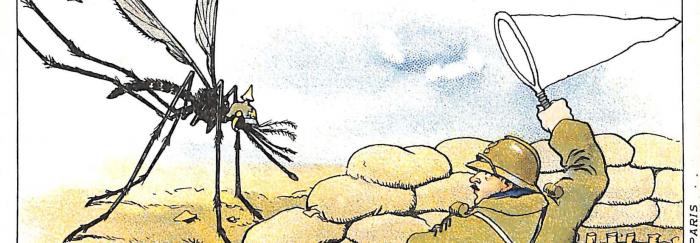Online exhibition: malaria in the spotlight
The present exhibition uses books, objects, and pictures to offer a virtual tour across the history of the fight against malaria, from the mythical origins of the first treatments to the latest pharmacological innovations.
Malaria has been commonly tagged as a poor's disease. Indeed, of the 219 million cases and more than 430,000 deaths in 2017, 90% were concentrated in sub-Saharan Africa, especially in the more poor and fragile areas.
Malaria, also known as paludism, is an infectious disease caused by five species of protozoan parasites of the genus Plasmodium. Along with pneumonia and diarrhea, it's one of the leading causes of infant death worldwide and one of the most important components of the vicious circle between disease and poverty in which the African continent is immersed. Some countries spend up to 40% of their total health budget on fighting malaria, and some estimates have put the loss of Africa’s disease-related gross national product at around € 9.5 billion a year.
Nowadays, the main tools against malaria are rapid diagnostic tests, artemisinin combination therapies, vector control — through fumigation and mass distribution of insecticide-impregnated mosquito nets — and prophylaxis through the intermittent administration of drugs to children, babies, and pregnant women. The long-awaited malaria vaccine is being piloted in three African countries - Malawi, Kenya and Ghana - through the expanded childhood immunization program. The results of this controlled implementation will determine its future large-scale deployment in Africa.
It is estimated that half of the world’s population currently lives in areas at risk of malaria, a disease that can be prevented and cured, but which, if not treated in time, evolves into almost always lethal forms. Thousands of people work every day to prevent it at all levels of the health systems of endemic countries, as well as in higher institutions such as the WHO, the agencies that provide financial support to countries — such as the Global Fund to Fight Tuberculosis. , AIDS and malaria — and organizations that support scientific research, including the Bill & Melinda Gates Foundation, the European Commission, and La Caixa, among many others. Together, they hope to reduce the weight of this disease for millions of people and, one day, eradicate it.
Curated by:
Dr. Quique Bassat
In colaboration with:
Institut de Salut Global de Barcelona
Organization:
CRAI Biblioteca del Campus Clínic



